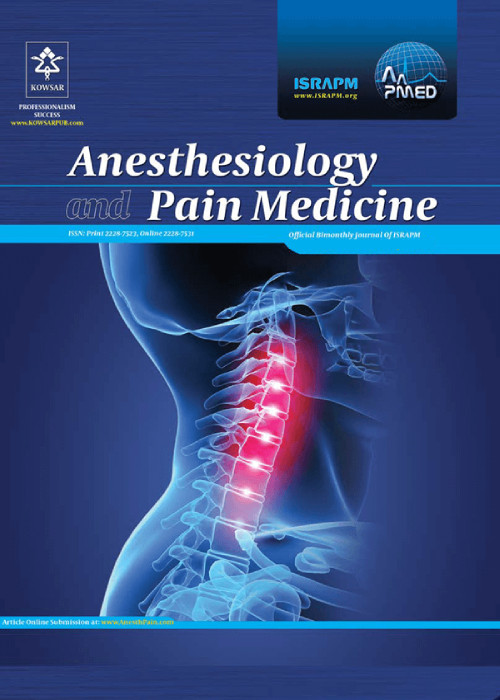The Effect of Glossopharyngeal Nerve Block on Post-Tonsillectomy Pain of Children; Randomized Controlled Trial
Author(s):
Article Type:
Research/Original Article (دارای رتبه معتبر)
Abstract:
Background
Sensory fibers of the glossopharyngeal nerve supply the tonsillar and peritonsillar areas. Thus, bilateral glossopharyngeal nerve block may alleviate post-tonsillectomy pain and improve postoperative analgesia.
Objectives
The purpose of this clinical trial was to evaluate the effect of glossopharyngeal nerve block on postoperative analgesia in children undergoing adeno-tonsillectomy
Methods
Ninety ASA I-II pediatric patients presented for adeno-tonsillectomy were included in this trial. They were equally divided and randomly assigned to one of two groups: A control group, in which children did not receive a nerve block, and a glossopharyngeal nerve block group, in which children received bilateral glossopharyngeal nerve block after surgery. The postoperative pain score (FLACC score) during rest and swallowing, the time for the first request for rescue analgesia, the total dose consumption of pethidine rescue analgesia, and the incidence of postoperative complications were all assessed. Moreover, response to gag reflex, degree of difficulty in swallowing, and parents’ satisfaction were recorded.
Results
Bilateral glossopharyngeal nerve block in children presented for adeno-tonsillectomy significantly prolonged the time for the first request of rescue analgesia, compared to the control group, reaching 5.833 ± 2.667 hours (P < 0.0001). It also decreased postoperative pethidine consumption to 0.878 ± 0.387 mg/kg (P = 0.0009). Moreover, it significantly decreased the postoperative FLACC score assessed two, four, six, and twelve hours after surgery, during rest and swallowing (P < 0.05). The response to gag reflex and difficulty in swallowing were also significantly decreased (P ≤ 0.0001 and 0.006, respectively). In addition, glossopharyngeal nerve block significantly increased parents’ satisfaction (P = 0.0002), with no significant increase in the incidence of postoperative complications (P > 0.05).
Conclusions
Bilateral glossopharyngeal nerve block in children undergoing adeno-tonsillectomy improved the duration and the quality of postoperative analgesia, decreased swallowing difficulties, and improved parents’ satisfaction.Keywords:
Language:
English
Published:
Anesthesiology and Pain Medicine, Volume:9 Issue: 2, Apr 2019
Page:
12
magiran.com/p1974956
دانلود و مطالعه متن این مقاله با یکی از روشهای زیر امکان پذیر است:
اشتراک شخصی
با عضویت و پرداخت آنلاین حق اشتراک یکساله به مبلغ 1,390,000ريال میتوانید 70 عنوان مطلب دانلود کنید!
اشتراک سازمانی
به کتابخانه دانشگاه یا محل کار خود پیشنهاد کنید تا اشتراک سازمانی این پایگاه را برای دسترسی نامحدود همه کاربران به متن مطالب تهیه نمایند!
توجه!
- حق عضویت دریافتی صرف حمایت از نشریات عضو و نگهداری، تکمیل و توسعه مگیران میشود.
- پرداخت حق اشتراک و دانلود مقالات اجازه بازنشر آن در سایر رسانههای چاپی و دیجیتال را به کاربر نمیدهد.
In order to view content subscription is required
Personal subscription
Subscribe magiran.com for 70 € euros via PayPal and download 70 articles during a year.
Organization subscription
Please contact us to subscribe your university or library for unlimited access!


